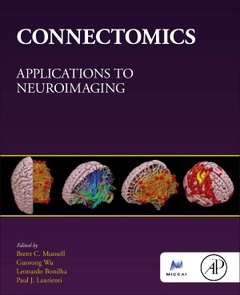Connectomics Applications to Neuroimaging The MICCAI Society book Series
Coordonnateurs : Munsell Brent C., Wu Guorong, Bonilha Leonardo, Laurienti Paul

Connectomics: Applications to Neuroimaging is unique in presenting the frontier of neuro-applications using brain connectomics techniques. The book describes state-of-the-art research that applies brain connectivity analysis techniques to a broad range of neurological and psychiatric disorders (Alzheimer?s, epilepsy, stroke, autism, Parkinson?s, drug or alcohol addiction, depression, bipolar, and schizophrenia), brain fingerprint applications, speech-language assessments, and cognitive assessment.
With this book the reader will learn:
- Basic mathematical principles underlying connectomics
- How connectomics is applied to a wide range of neuro-applications
- What is the future direction of connectomics techniques.
This book is an ideal reference for researchers and graduate students in computer science, data science, computational neuroscience, computational physics, or mathematics who need to understand how computational models derived from brain connectivity data are being used in clinical applications, as well as neuroscientists and medical researchers wanting an overview of the technical methods.
Features:
- Combines connectomics methods with relevant and interesting neuro-applications
- Covers most of the hot topics in neuroscience and clinical areas
- Appeals to researchers in a wide range of disciplines: computer science, engineering, data science, mathematics, computational physics, computational neuroscience, as well as neuroscience, and medical researchers interested in the technical methods of connectomics
2. Insights Into Cognition from Network Science Analyses of Human Brain Functional Connectivity:Working Memory as a Test Case
3. Overlapping and Dynamic Networks of the Emotional Brain
4. The Uniqueness of the Individual Functional Connectome
5. Dysfunctional Brain Network Organization in Neurodevelopmental Disorders
6. Addiction: Informing Drug Abuse Interventions with Brain Networks
7. Connectivity and Dysconnectivity: A Brief History of Functional Connectivity Research in Schizophrenia and Future Directions
8. Genetics of Brain Networks and Connectivity
9. Characterizing Dynamic Functional Connectivity Using Data-Driven Approaches and its Application in the Diagnosis of Alzheimer’s Disease
10. Toward a more Integrative Cognitive Neuroscience of Episodic Memory
Guorong Wu is an Assistant Professor of Radiology and Biomedical Research Imaging Center (BRIC) in the University of North Carolina at Chapel Hill. Dr. Wu received his PhD degree from the Department of Computer Science in Shanghai Jiao Tong University in 2007. After graduation, he worked for Pixelworks and joined University of North Carolina at Chapel Hill in 2009. Dr. Wu’s research aims to develop computational tools for biomedical imaging analysis and computer assisted diagnosis. He is interested in medical image processing, machine learning and pattern recognition. He has published more than 100 papers in the international journals and conferences. Dr. Wu is actively in the development of medical image processing software to facilitate the scientific research on neuroscience and radiology therapy.
Dr Leonardo Bonilha is a neurologist and clinical researcher, working within neurophysiology, epilepsy, language proble
- Combines connectomics methods with relevant and interesting neuro-applications
- Presents information that will appeal to researchers in a wide range of disciplines, including computer science, engineering, data science, mathematics, computational physics, computational neuroscience, and more
- Includes a mathematics primer that formulates connectomics from an applied point-of-view, thus avoiding difficult to understand theoretical perspective
- Lists publicly available neuro-imaging datasets that can be used to construct structural and functional connectomes
Date de parution : 09-2018
Ouvrage de 233 p.
19x23.3 cm
Thèmes de Connectomics :
Mots-clés :
Addiction; Alzheimer's diseases; Attention deficit/hyperactivity disorder; Autism spectrum disorder; Autisms; Brain; Bridges; Cognition; Connectivity; Connectome-based predictive modeling; Default mode network (DMN); DTI; Dynamic functional connectivity (dFC); Dynamic networks; Dysconnectivity; Emotion; Episodic memory; Executive control network (ECN); Fragile X; Functional connectivity; Functional connectivity (FC); Functional imaging; Functional magnetic resonance imaging (fMRI); Genetic studies; Genetics; Graph theory; Graphical models; Hubs; Human neuroscience; Huntington's disease; Independent component analysis; Independent component analysis (ICA); Individual differences; Integration/segregation; Network; Network analysis; Network science; Neurogenetic disorder; Overlapping networks; Patient heterogeneity; Resting-state functional magnetic resonance imaging (fMRI); Reward processing; Salience network (SN); Schizophrenia; Seed-based analysis; Structural imaging; Tensor analysis; Treatment; Working memory
